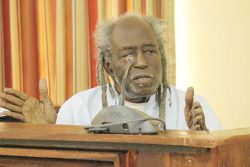A report by United States-based business magazine Forbes has revealed that Guyanese account for the largest diaspora population when compared to the rest of the world.
The report, published on Friday, said that out of all sovereign countries with at least 750,000 inhabitants, Guyana had the biggest share of its native-born population—36.4%—living abroad. It added that Jamaica came in at number five with 28.6% of its population living abroad.
The report said that “the list of countries with the biggest share of the native-born population living in the diaspora reveals stories of war and displacement but also of economic stagnation and a lack of perspectives. While there are many reasons why someone might leave the place where they were born, small countries are most often affected by the phenomenon as they are inherently at a disadvantage when offering opportunities and chances to move within the country first.”
It noted that taking into account independent countries of all sizes, island nations dominate the top ranks with up to half of their populations settled in other countries. The Forbes report identified Polynesia as the region with the highest overall diaspora share [28.7%] in 2020, followed by the Caribbean at 17.7%.
The report indicated that the world’s least developed countries saw the biggest exodus with their diasporas making up an average of 12.5% of their native-born populations, way ahead of less developed and more developed countries at around 3-6% of people living abroad. It further stated that the United Nations population division calculates estimates of the residential population of countries and of global migrant stock, where 2020 is the latest available year.
“For migrants, the organization determines their status by country of birth if possible. If not, migrant status might be determined by citizenship, which can cause both an undercounting and an overcounting of migrants. In places where many foreign-born residents have gained citizenship, the number of migrants will be an underestimation. In cases where native-born people do not automatically receive citizenship, which can happen among refugee populations but also in countries with restrictive laws, the number of migrants would be overestimated,” the report highlighted.
Providing more statistics on migrant populations, Forbes said that the countries in Eastern Europe and the Balkans also have large diasporas. It identified that after the collapse of communism in the early 1990s, the majority of eastern Europeans migrated to the west.
War and civil conflicts also fuelled migration in the region as well. Bosnia and Herzegovina—which declared independence in 1991 during the fall of communist Yugoslavia and saw a bloody ethnic war in the aftermath—had 34% of its population living abroad in 2020. Albania ended more than forty years of communism and international isolation in 1992.
“Serious financial mismanagement and an ensuing civil war kept the country in dire straits throughout the 1990s and into the new millennium. Today, almost a third of the population lives abroad. More Eastern European nations and former Soviet Republics among the countries with the largest diasporas in the world are Moldova, Armenia, North Macedonia, Croatia and Kazakhstan.
“Countries which are currently or have very recently been embroiled in war and conflict also make significant appearances on the list. Syria, a nation of around 28 million native-born people, now has eight million of them—or around 30%—living abroad. South Sudan, where a civil war officially ended in 2020, has a diaspora share of 21%. Countries that are severely mismanaged by their governments include Eritrea at an 18.5% diaspora share and Venezuela at 16.6%. Another continental Latin American country has an even bigger diaspora: El Salvador’s civil war ended in 1992, but gang violence has prevailed—more than 20% of the nation now lives abroad,” the report highlighted.
It further revealed that the largest conflict-driven diaspora is from Palestine, a non-Sovereign territory, with more than 45% of its population residing abroad.










